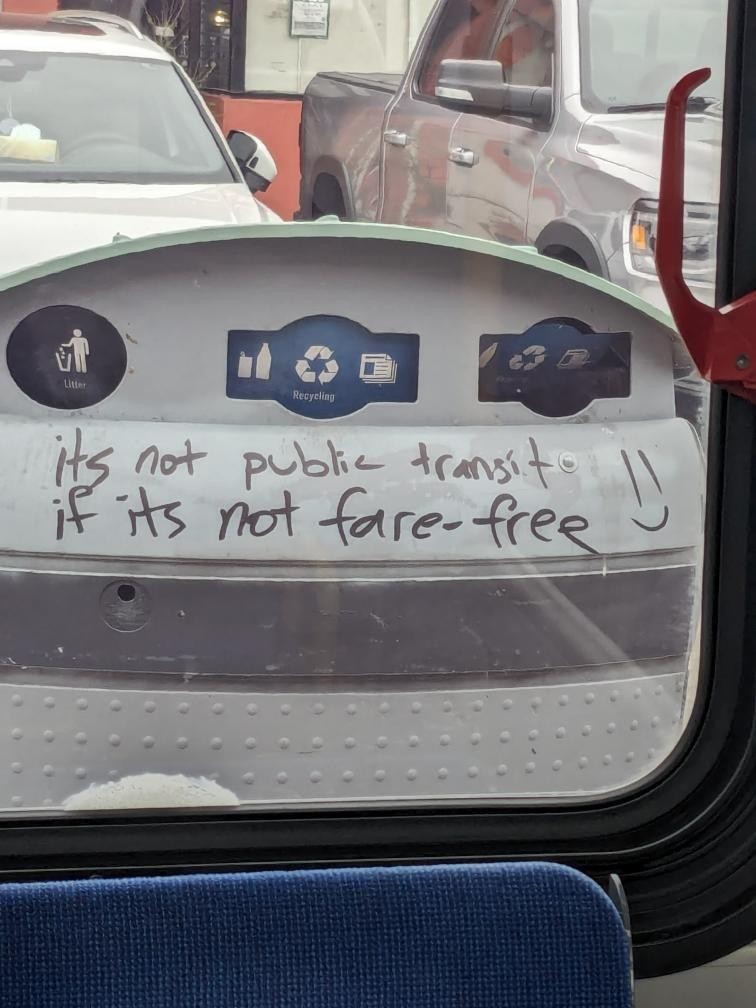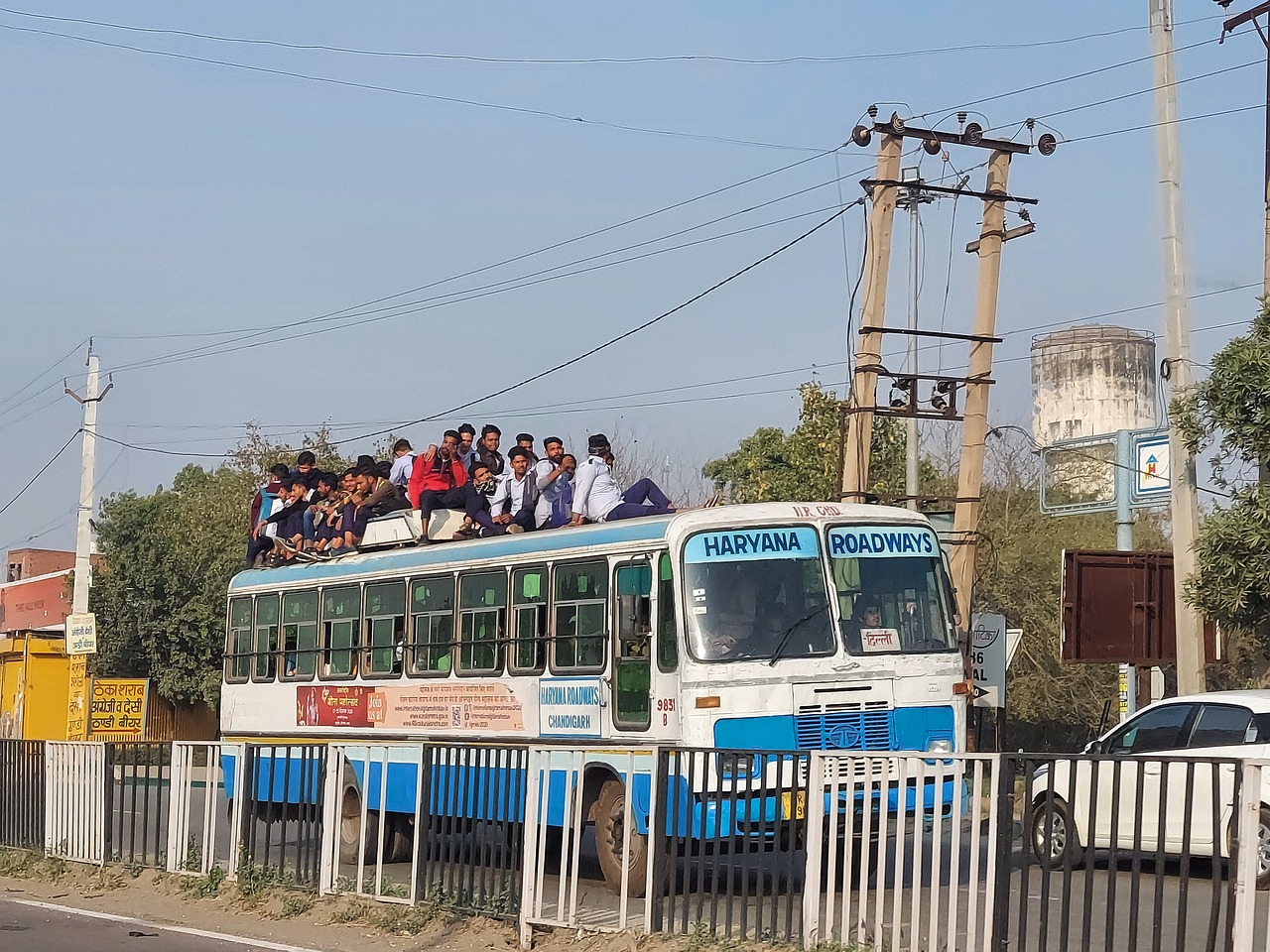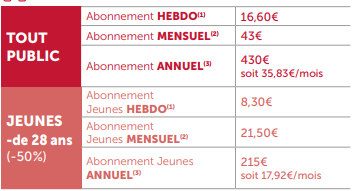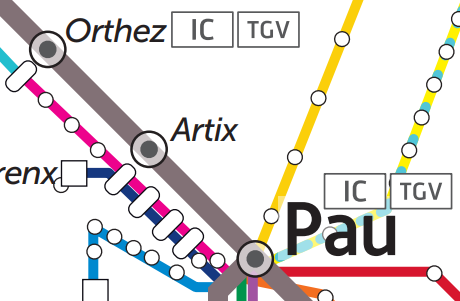Why public transport costs money? (And "You don't understand why things cost money")
The Radical Graffiti social media account posted quite a thought provoking picture today:

I challenged this claim with a succint explanation here:

BLUE: an interesting observation but surely you can have public facilities, maybe some universal basic income, and assign a modest usage fee to encourage sensible resource utilisation? wording it is probably a bit long for some quick graffiti art tho' :)
RED: why not just skip the middleman and subsidise the bus fare so it costs $0. UBI is paying Peter to pay Paul.
BLUE: yeah, though maybe it's worth putting a price on something that uses resources to encourage sensible usage. its a good reminder that using that thing should be valued.
RED: that's not why things cost money.
ME: Prices of buses in my area are 2.30€ for any bus you can climb in within the hour. Refugees, disabled people, and people with less than 960€ per adult per month of income get an 80% discount (that's 0.46€) and here yes, the goal is not to fund the bus with the ticket. It is to make it seem like a service you pay for so that people respect the service
RED: that's not why things cost money.
ME: that is why local public transport costs token amounts of money. They are precisely that: tokens
RED: got it, you don't understand why things cost money.
next.
I aim to challenge both claims: fare-free transportation is better than public transportation that has a token fee, and "you don't understand why things cost money".
Sociological angle
For any person that has been elected, it is obvious that public transportation needs to cost to the community a set amount of money. It needs to be planned and budgeted. It has to be properly documented, and then it has to be actually enacted.
For public transportation to be useful, it has to meet the following criteria:
- It can pick up the user when the user needs it
- It can drop the user where the user needs to go
- It is affordable, in terms of time or money, to take the transport
But see, there is a problem with "It can pick up the user when the user needs it".

Overcrowding
A public bus that is full has failed its mission. If you are a minimum wage worker or a destitute trying to get home and the last bus cannot take you, the public service failed you. A bus needs to be there for "the user [that] needs it".
So you want to de-insentivise the use of the transport just enough to keep the buses around just 50% full on their 99% worst day. How do you do that? Fees. Even a very small fee will generate enough inconvenience that some people will not take the bus, particularly if it needs to be paid in cash.
Conflicting interests
But with said fees, we run into the problem of "It is affordable, in terms of time or money, to take the transport". Let's look at the example I took for more details:
| Full price | Special price | Gas for the same trip (5L/100km @ 1.72€/L) | |
|---|---|---|---|
| Bus 520 | 2.30 | 0.46 | 4.0678 |
| Bus 3011 | 2.30 | 0.46 | 4.257 |
| Bus 531 | 2.30 | 0.46 | 19.0146 |
The bus is always more affordable than the car (big surprise). Now let's look at the first worst case, someone 1€ above the limit for cheaper buses, meaning a single person that earns 961€ per month after taxes alone (subsidies omitted), or a single person with a child earning 1441€ per month after taxes (subsidies omitted).
Assuming they need to get to work 5 times a week, that gives us:
| Food | Rend | Utilities | Extras | Transportation | Total | |
|---|---|---|---|---|---|---|
| Single | 280 | 430 | 120 | 60 | 92 | 982 |
| Single+Child | 360 (+48) | 550 | 120 | 90 | 92 (+30) | 1290 |
Oh, I omited to take into account that you can subscribe to the bus service:

| Food | Rend | Utilities | Extras | Transportation | Total | |
|---|---|---|---|---|---|---|
| Single | 280 | 430 | 120 | 60 | 43 | 933 |
| Single+Child | 360 (+48) | 550 | 120 | 90 | 43 (+30) | 1241 |
Notice that I set the food budget high, that is because people lacking good means of transportation will often do groceries closer to home, which will often be more expensive. I also added, for the single person with child, the cost of school meals, post-school nursery, and a student bus pass.
You want both of these persons that are highly motivated to get a bus everyday to never have a day when they cannot take the bus.
If money is of no concern, doing that with a car is much costlier:
- Mandatory insurance: between 15€/m and 110€/m (it is very expensive for new drivers)
- Gas: 20 trips of 43km will run you, at a very conservative and irrealistic 3L/100km at 44.37€ per month
- Repairs: I have always been advised that repairs cost monthly half as much as gas, so I will say a very conservative 22€
So a very lucky driver with a golden hand on their speed stick will run around 80€ per month for their car.
So why doesn't everyone take the bus?
Inconvenience is key
And fees are the easiest and cheapest inconvenience to implement.
Economic angle
As stated before, a public bus cannot be viable if it is full, as its lack of reliability will force users to pick another mean of transportation for their most regular transit.
So you want to maximize occupancy while below 100%. Your worst enemies are Mondays and Fridays (as students will take the bus to go to their accomodation close to universities and come back).
As you are public transit, you bus will never be profitable. Out of the 54 seats, out of rush hours, 80% will be empty at best, all of them at worst. If you wanted to make back just the salary of the driver and the gas, it would need to be making around 20€/h or 30€ per trip for that example, plus the equivalent of 10L of diesel i.e. 17.2€, which is around 47€ in 10 seats.
During rush hours, you will probably have 20% of empty seats so for the same 47€, they need to be profitable in 42 seats.
That would not take into account any support staff, any repairs, the purchase of the bus, the furniture of the bus, the cleaning of the bus, the storage of the bus...
Running buses with the presented prices is not affordable.
But how much do these incomes represent? Let's again take the worst case:
| 7 AM | 8 AM | 11 AM | 1 PM | 5 PM | 6 PM | |
|---|---|---|---|---|---|---|
| Monday | 23 | 23 | 4.6 | 4.6 | 18.4 | 18.4 |
| Tuesday | 18.4 | 18.4 | 4.6 | 4.6 | 18.4 | 18.4 |
| Wednesday | 18.4 | 18.4 | 4.6 | 4.6 | 18.4 | 18.4 |
| Thursday | 18.4 | 18.4 | 4.6 | 4.6 | 18.4 | 18.4 |
| Friday | 18.4 | 18.4 | 4.6 | 4.6 | 23 | 23 |
| Saturday | 0 | 23 | 4.6 | 4.6 | 4.6 | 0 |
| Sunday | 0 | 0 | 0 | 0 | 0 | 0 |
The minimal income with the expected bus occupancy that will be earned is 469.2€ in a week. The total cost for the region for a year of transport just for the buses was 107M€, that is 2M€ per week, or around 8333.33€ per week per line of bus. At maximum occupancy and maximum price, the total income would be 4098.6€ per week, or around 50% of the current cost paid by the local government, but that is in the irrealistic setting of 33 filled buses. And the more realistic number is of buses that are mostly empty and paid with cheaper subscriptions and special tickets, I would eye-ball that at double the minimal figure of 469.2€/week.
As it stands, any revenue from sales of tickets is a token compared to the operation costs.
But it never the less helps augment the number of lines available for the local government.
Conclusion
For 5% of the budget of the most unfortunate households that use, we can fund 20% of the public transport and ensure that those members of society (I am part of them) can use public transportation to reliably get to work, perform their administrative duties, and do so without impeding on the usage of public transportation by their peers.
I want to also add that it makes people care about the public transit system, it gives them a vague idea of what it costs to run it, and reduces friction with the "car goers" that may feel that public transportation is a waste of public spending (and have I met many like that). Here I only talked about the buses, but trains are much the same. The bus line I was talking about actually runs parallel to a train line:

The train is priced around 4 times as much as the bus, and is following similar occupancy patterns as buses. It also cuts a 1h10 bus trip into a 22 minutes train ride. It also requires exclusive infrastructure that a lot of "car goers" feel is far too costly. It is for this region the same investment as buses for fewer lines, that is because buses use on general infrastructure, but I omit from this transportation of goods by train which is in an entirely different budget.
Sources (in French, sadly):
- https://transports.nouvelle-aquitaine.fr/sites/default/files/timetable_files/Fiche horaire Cars régionaux--.pdf
- https://www.nouvelle-aquitaine.fr/sites/default/files/2022-03/Rapport_presentation_budget_principal_2022_Nouvelle-Aquitaine.pdf
- https://transports.nouvelle-aquitaine.fr/cars-regionaux/reseau-et-horaires
If you like my content and want more, please donate. If everyone that finds my content useful paid $1 every week, I would be able to produce content for 1 week a month without relying on other sources of income for that week.
